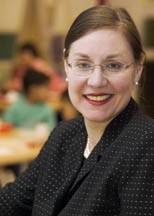 Community Improvement Through Youth (CITY) Project’s Eco-Meal Challenge, piloted by the CITY Teen Leaders, was selected by Food, Nutrition & Policy Consultants in Washington, DC to be presented to the First Lady Michelle Obama in a collection spotlighting the nation’s most innovative nutrition education programs. This information was shared with the First Lady as she prepared to unveil her campaign to confront childhood obesity.
Community Improvement Through Youth (CITY) Project’s Eco-Meal Challenge, piloted by the CITY Teen Leaders, was selected by Food, Nutrition & Policy Consultants in Washington, DC to be presented to the First Lady Michelle Obama in a collection spotlighting the nation’s most innovative nutrition education programs. This information was shared with the First Lady as she prepared to unveil her campaign to confront childhood obesity.
The Eco-Meal Challenge was developed by Jamila Simon, M.S. while she was the Project Coordinator for the CITY Project, Cornell University Cooperative Extension, New York City and piloted by the CITY Project Teen Leaders, Cornell Cooperative Extension of Broome County in conjunction with One Seed at a Time: Alleviating Climate Change through Youth Community Action in the Garden Project.
Through the Eco-Meal Challenge, the CITY Teen Leaders learn how their decisions about grocery shopping and food preparation impact climate change (see photos). They learn to calculate the "carbon footprint" of preparing community meals as they score points for decisions about such things as shopping at local Farmers' Markets (where food travels shorter distances), buying larger containers of food, making their own reusable bags and composting. The CITY Teen Leaders learn about the impact of climate change and explore how they can make a difference in their communities through sustainable gardening practices.
 One Seed at a Time was a collaboration between the CITY Project and Marcia Eames-Sheavly and Christine Hadekel, Cornell Garden-Based Learning Program, Department of Horticulture. Vicki Giarratano is the CITY Project Director and Kelly Maybee is the CITY Project Coordinator, CCE Broome County.
One Seed at a Time was a collaboration between the CITY Project and Marcia Eames-Sheavly and Christine Hadekel, Cornell Garden-Based Learning Program, Department of Horticulture. Vicki Giarratano is the CITY Project Director and Kelly Maybee is the CITY Project Coordinator, CCE Broome County.
The CITY Project is a recipient of the 4-H Families Count: Annie E. Casey Family Strengthening Award and is a 4-H National Headquarters Program of Distinction.
June P. Mead is the CITY Project Director and Program Evaluator. The CITY Project is part of the Children, Youth and Families At-Risk (CYFAR) Program, Sustainable Community Projects (SCP). It is supported by Smith Lever funds, National Institute of Food and Agriculture (NIFA), U.S. Department of Agriculture.
For Further Information
CITY Project website





